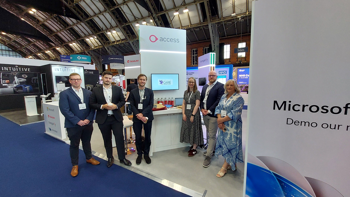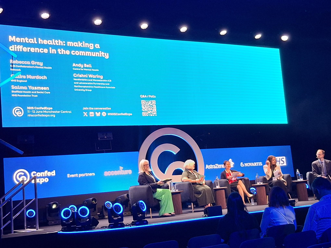
With the 10-Year Plan also on the horizon, there was a clear sense of urgency around what comes next, how progress will be measured, and where and how care will best be delivered going forward.
As a result of these events, the sessions across Confed took on an even greater significance this year. From leadership and digital transformation to community care and commissioning, many of the discussions were centred on how to turn ambition into action and how we as a nation must start turning these long-standing ideas into a reality.
With this in mind, here’s our take on the conversations that struck the most chords:
A Vision for the Future: Wes Streeting’s Keynote Address
In the most anticipated session of the two days, Wes Streeting laid out five defining principles for a reimagined NHS operating model:
- Clarity – Streamlining the system with fewer, outcome-driven targets and defined leadership roles.
- Consequences for performance – Reinvigorating the Foundation Trust model with earned autonomy and robust intervention for underperformance.
- Leadership matters – Creating a new generation of system-level leaders, incentivised by performance and empowered to innovate.
- Funding tied to outcomes – Shifting investment away from inputs and activity towards measurable impact.
- Patient power – Placing outcomes, transparency, and patient voice at the heart of NHS strategy.
Streeting framed the £29 billion settlement as generous yet insufficient, with a need for reform alongside investment. He cited early signs of recovery in elective care, including 3.6 million more appointments compared to last year and 187,000 additional cancer diagnoses made within 28 days. He also confirmed plans to invest £10 billion in digital transformation, hire thousands more GPs, and deliver the highest-ever capital investment in NHS infrastructure.
Streeting stressed the need to build digital skills across the workforce and pointed to the growing role of technology in delivering care remotely - whether on the high street, over the phone or through digital services. With hospitals under huge pressure, he called for services to be redesigned closer to home and backed the new Model ICB Blueprint operating model that puts more trust in regions and integrated care boards.
While he acknowledged the scale of the challenge ahead, Streeting’s message was one of unwavering tenacity and optimism:
“The NHS is in a fight for its life, but nothing I have experienced in my first 11 months in office has shaken my conviction or confidence that this is a fight we will win.”

From Hospital to Community: Mental Health at the Forefront
Sessions led by Claire Murdoch, Andy Bell, and Rebecca Gray reinforced the urgent need to shift mental health care into communities. Speakers highlighted the importance of early intervention, youth and older people’s mental health, and wider support like housing. Community hubs, designed with input from local people and VCSEs, were positioned as essential to making this vision work.
During the Mental Health: Making a Difference in the Community session, Salma Yasmeen and Crishni Waring issued strong calls to address health inequalities and strengthen locally-led care. With demand for mental health support at an all-time high (over 1m people are currently on waiting lists in England alone) community-based models are integral to reducing these numbers and preventing escalations into acute care.
As Andy Bell put it: “This is about rebalancing the system, not abandoning clinical care but broadening what care means.” Rebecca Gray echoed this, closing the session with a reminder that this must go beyond strategy: “The future of mental health care depends on communities being given the tools and trust to lead the change from the ground up.”

Digital Driving the Way
In sessions on AI and productivity, speakers including Matthew Trainer, Darren Kilroy and Alex Kafetz described how digital tools are already transforming clinical workflows. However, with AI becoming more sophisticated and widely adopted in clinical settings, the speakers stressed that it must continue to be used with caution and isn’t a replacement for human judgement or intelligence.
“We need to ensure AI isn’t just for the digitally literate,” warned Trainer. Kafetz added that digital signals like changes in sleep or shopping habits, could inform preventative interventions if used responsibly.
Access and equity were also brought up as major concerns across the two days. As per an NHS report from January this year, close to 10 million adults in the UK lack foundation-level digital skills, with approximately 30% of offline individuals finding the NHS difficult to navigate. Whilst Chancellor Reeves announced £10m in ringfenced funding to support the shift from analogue to digital and expand tools like the NHS app, speakers emphasised that technology shouldn’t make access to quality care harder than it already is.

Neighbourhood Health Needs Local Leadership
While moving from hospital to community-based care was a big theme across the event, the Leadership in a Time of Neighbourhood Health session on day two focused on how to actually make it work in practice. Speakers like Samantha Allen, joined once again by Matthew Trainer, explored what it takes to build real neighbourhood health models that last - from valuing community-based staff more fairly to shifting power away from hospitals and into local teams. They also called for better investment in prevention and a cultural shift that sees neighbourhood care as a key part of the NHS’s future.
Integration was described as the bonding glue to these models, but it can’t be instructed from above. It needs local teams who trust each other, strong leadership, and space to try new things. Louise Ansari from Healthwatch also made a strong point during the How Integrated Neighbourhood Teams Are Working for Communities panel later that afternoon, noting that many people assume their care is already joined up - even when services are still working in silos. Julia Worthington echoed this, stressing that “integration lives in the relationships, not just the structures,” and pointed to cross-sector huddles and shared space as practical ways to rebuild connection on the ground.
All the speakers agreed that what matters most is enabling the simple things that make local care work: regular communication, shared responsibility, and empowered leadership. As Danny Mortimer put it: “Neighbourhood working isn’t new, but what is new is the clarity and commitment to finally get it right.”
Redesigning Dementia Pathways Through Collaboration
A standout session on dementia innovation showcased what’s possible when the NHS, academia, and industry work together. Dr Matea Deliu (NHS South East London ICB), alongside Antonio Ruiz-Gonzalez and Zunera Khan from the Health Innovation Network and King’s College London, explored how digital tools and co-production are helping to reshape dementia care from diagnosis to daily living.
The panel highlighted the slow pace and variability of current pathways, with Antonio Ruiz-Gonzalez noting that patients often experience delays and a lack of continuity when transitioning between services. In response, they outlined efforts to improve consistency and engagement through community-led design and digital accessibility. “We must design services around people’s real lives, not just their conditions,” Ruiz-Gonzalez said, calling for culturally sensitive interventions and more inclusive outreach.
Zunera Khan reinforced this by stressing the value of co-production with underrepresented groups, particularly when building tools for early diagnosis. She pointed to the need for greater awareness and trust, especially in communities where stigma or language barriers persist.
The session also made clear that innovation doesn’t have to mean complex solutions - even small digital prompts, when designed inclusively, can help patients and carers feel more supported. As one speaker put it, “a timely reminder or a check-in message can be the difference between someone coping or hitting crisis.”
With dementia affecting around 900,000 people in the UK - a number expected to surpass one million by 2030 - there was a shared sense of urgency to act now and scale what works. The session concluded with a call to embed lived experience into every layer of system design, ensuring that future care is not only smarter, but more human.

Proactive by Design: The Leadership Behind Prevention
As the health system prepares for the 10-Year Plan, one session stood out for its focus on future-facing care. Leadership and the Left Shift, featuring speakers like Dr Claire Fuller (NHS England), Sarah Woolnough (The King’s Fund), Vani Manja (Boehringer Ingelheim), and Ben Richardson (Carnall Farrar), explored what it really means to move from treatment to prevention.
Dr Fuller pointed out how terms like "left shift" and "neighbourhood care" are often used interchangeably, but without clearer definitions, progress risks being lost in translation. Woolnough agreed, noting that The King’s Fund has found no consistent understanding across the system of what this shift actually looks like in practice. The panel stressed the need for flexibility and local adaptation over one-size-fits-all models.
There was also a strong focus on outcomes that matter to people. As Manja put it, "We need to focus on health span, not just lifespan." That means prioritising quality of life and preventing avoidable decline, not just extending it.
However, prevention cannot be achieved in a vacuum. Fuller reminded the audience that "unless urgent care is under control, you can’t create room for prevention." The challenge is balancing immediate demand with long-term planning. To succeed, the system needs courageous leadership, clear accountability, and a commitment to thinking beyond the short term.

Closing Reflections
NHS Confed 2025 proved to be another awe-inspiring event, but it was apparent that the future of the NHS won’t be built through another wave of top-down reform, but through practical, local delivery that’s backed by trust, digital confidence, integrated systems and collaboration.
From AI to neighbourhood care, and from mental health to discharge planning, the sessions reflected a system that knows what needs to change and it’s finally pushing to make it happen. There was recognition that transformation takes time, but also a shared frustration with delays and disconnection. As many speakers emphasised, progress now depends on supporting the people already doing the work, removing barriers rather than adding more.
Above all, the event showed that the appetite for change is real. Whether it’s moving care closer to home, building digitally confident teams, or embedding prevention into the core of service delivery, the system is ready but it needs the space, investment, and leadership to deliver at scale.
All eyes will now be on NHS Confed 2026 - not just to reflect on progress, but to see whether this year’s commitments have delivered real change and driven impact where it’s needed most.

 AU & NZ
AU & NZ
 SG
SG
 MY
MY
 US
US
 IE
IE

